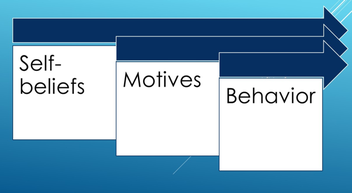 Courtesy of author Dr. Bobby Hoffman: Motivation for Learning and Performance. Courtesy of author Dr. Bobby Hoffman: Motivation for Learning and Performance.
Self-beliefs. Each of us hold a number of different beliefs about the world in which we live. Some are minor beliefs, but others can have a profound influence on success. For instance, to what degree do you believe in destiny, fate, or luck? People that hold a strong belief that control is external will have less personal success than people that believe they are in charge of their own destiny. Beliefs influence our motivation which then shapes our behaviors. One reason behavioral analysis has struggled is the difficulty in tracing an observed behavior to a single root cause. Two people may commit a similar crime (theft), but hold radically different self-beliefs that led to different motivations for the commission of the theft. As the number one enemy of success, there is some good and bad news. The good news is that self-beliefs are adaptive, your beliefs can evolve over time. The bad news is self-beliefs are stubborn and modifying one's beliefs is not a clearly defined linear process. The stubborn nature of our beliefs results in behaviors that are highly adaptive in one environment, but maladaptive in another. Consider a child raised in a large family, developing a strong collectivist belief verses a belief in individualism. As the child leaves the family environment to enter the workforce he or she will most likely find it more difficult to find success in certain industries where a collectivist belief is often maladaptive, e.g. a stock trader or car sales. The bottom line, the beliefs we hold are a powerful key that can drive or inhibit success. The main challenge is that we most often do not even realize how our beliefs and environment interact to influence our motivations and corresponding behaviors. If you want to know how you can combat this enemy there are various techniques that revolve around the larger concept of "self-regulation". It is through self-regulation that both the symptoms and causes of maladaptive behaviors can be addressed. I have included a link to a 1991 article published by Dr. Albert Bandura, arguably the leading expert on self-regulation, and a link to Dr. Hoffman's work which is more current, published in 2015.
Note: This article was initially a response to the question, "What is the Biggest Enemy of Success?" on Quora.com.
0 Comments
Your comment will be posted after it is approved.
Leave a Reply. |
Authors
Richard Feenstra is an educational psychologist, with a focus on judgment and decision making.
(read more) 
Bobby Hoffman is the author of "Hack Your Motivation" and a professor of educational psychology at the University of Central Florida.
(read more) Archives
April 2023
Categories |
 RSS Feed
RSS Feed
